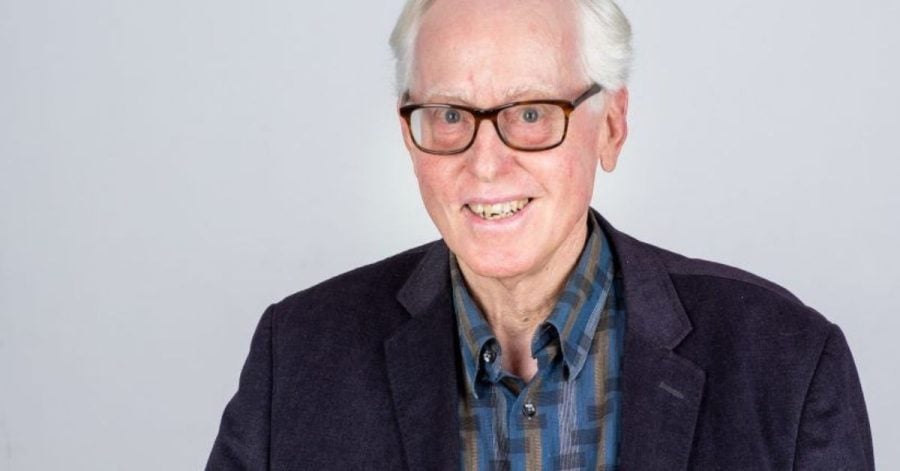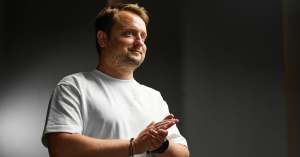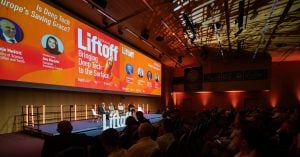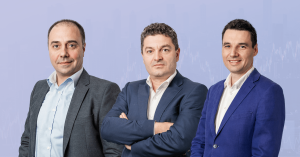In the past few decades, Bulgaria has transformed from a country aspiring to deliver a high value contribution to the Western-bound exploding tech industry to a fast-developing tech hub of young talent ready to conquer the world. This has provoked a variety of tech leaders, entrepreneurs, and investors to explore what the country has to offer.
Bringing intercultural diversity in a community of highly-skilled tech professionals yearning for establishing deeper connections with Silicon Valley is what brought the highly renowned financial consultant and investment manager Larry Biehl to Bulgaria. Almost 8 years ago, Larry arrived in Bulgaria with the idea to present to this part of the world a different perspective on American culture, based on tradition and values, and not the one that the media had been presenting. However, what Larry Biehl found here was “a highly developed and well-regarded technology sector, with universities and private academies producing aspiring software engineers, and a burgeoning entrepreneurial infrastructure eager to explore Silicon Valley from up close”.
Returning some years later, Larry Biehl and peer-investors decided to establish a public charity in Bulgaria called the Bulgarian Entrepreneurship Center – to create a bridge linking Silicon Valley to Bulgaria and vice versa. The idea was to build a space to stimulate talent to stay in Bulgaria.
Recently, he came back to Bulgaria to boost the positive attitude of stakeholders towards delivering social impact on a community level. He met with governmental and business officials to raise awareness about increasing companies’ ESG impact and implementing the SIB (social impact bonds) methodology in Bulgarian schools (how does that work – find out in the interview below). He also took part in Teenovator – an annual two-day competition where high-school students compete with business ideas, which they present before a jury of investors.
Larry Biehl’s financial career goes back to the time of the birth of Silicon Valley. Having started his first business in 1969, his clients were people coming out of all of the big companies in the Valley such as Apple, Microsoft, etc. This gave him an exquisite access to observing how the business cycle works, how employees’ interests fit in that cycle, and in what ways businesses can add social value to the lives of the communities they serve.
The Recursive spent some time with Larry Biehl, talking about his aspiring professional story and how entrepreneurs can deliver social value. Here’s what he shared with us.
The Recursive: How would you define the level of the development of the Bulgarian tech ecosystem? What has improved since you first arrived and what is it that is still missing?
Larry Biehl: Bulgaria has the talent in terms of IT pack, which just happens to be the number one priority. People are skilled in what’s necessary to lead the world. When I came here 5 years ago, there were 2 or 3 venture capital companies, now they’re like fifteen. The EU has just been throwing money behind new startups – but that has positives and negatives. The positive is there’s money here. But effectively, you’ve been treated as a welfare state. One thing we’ve learned in America and particularly in terms of racial inequality is that if you just throw money at something, people expect next time to compensate them with more money. So it’s like giving the fish, not teaching them how to fish. You need to move away from relying on the EU to try to lift you from the bottom of its 27 nations. The reason things exploded in the Valley was that if you worked at a new startup, because of the competition, I was going to offer you some preferred status and ability to own some stock. Which, of course, these tech people did, and then they worked for three months or three years for the company and went public. Then they got cash in, they went on vacation, did surfing and climbed Mount Kilimanjaro, and then they came back to join any company they wanted to.
Bulgaria is starting to form a group of interactive founders, who are starting to realize wealth as they exit from these companies and sell them, or merge them. So money is starting to be formed. And money attracts money. We are at the cusp of the largest wealth management firm in the world- the Swiss UBS, who is starting to take an interest in Bulgaria. They have never wanted to do anything with Bulgaria. For one basic reason- you’re corrupt. But last year, through mine and Lilly Drumeva’s help (ed. note – director of the Bulgarian Entrepreneurship Center), we were able to bring them into two major projects- one for improving child welfare in the Roma community; the second – for training teachers.
My hope is that the government will see this as a good idea. We’re going to double the size of participants next year- 1000 students in 60 different cities and high schools. This happens after UBS estimated that they had never experienced such success in 13 years of dealing with such problems around the world.
So what has been done here? First, I’m working on the development impact bonds, which is what we’re going to be doing in the United States to create social impact. Because of things like ESG, social impact is the gold standard now for companies to spend time basically spawning and promoting. Why? Because investors want to know that their values align with the companies that they’re putting their money into. Employees want to know they’re working for people they can respect and trust. And customers: according to the region’s surveys, 25% of the decision to spend every dollar is based on ESG factors. I mean, that was nothing two years ago. The problem is that these development impact bonds are small in size. So who’s gonna put up their money? I’m working with a group that suddenly wants to open their store in Bulgaria. The Power of BG (ed.note – a non-formal group of entrepreneurs), who now are creating wealth for themselves, are smart. If they invest a portion of their wealth into creating social impact, that makes them look good.
And I tell you, anybody who’s rich, wants to be admired. They don’t want to be envied. Right? The only way you can be admired is if you do something for somebody else. So they have an interest in doing it. The country has an interest in seeing that their corporate power houses are contributing to lifting all boats within the community. And then if you don’t make a strong community, you’re basically creating vulnerability and fragility and the system is going to crumble. And it’s going to take you down with it. So this is why this trip is so important to me – I wanted to make sure this was still here.
So we need to develop some significant development impact bonds, in which there are investors, as well as the wealth that’s being created out of entrepreneurship. Because I want to use money, but I want to pay for results, not for just trying to defer – because the whole mindset I want to get people off is the idea of the welfare state. The concept is that everybody does what they know how to do best. Let the investors invest; but the people who know how to do business – let them do business to create positive results.
What are the most effective ways to develop social impact understanding in young entrepreneurs?
Larry Biehl: It’s basically been created, because people are selfish. People with money. Money doesn’t make them better people. Andrew Carnegie is held up as the number one philanthropist in America. Well, he was basically a selfish capitalist. But by going through a transformation, he realized that he got to do things that helped people, not hurt people. And he started putting money into socially impactful causes. I will tell every client of my company, and my company has been in existence for 55 years ago: “I’m here to transform your wealth into value and to move you away from just being personally successful to being significant. This means having social impact and changing the world for the better”. So don’t change people’s attitudes particularly about money. But let’s organize them so that they can see their self-interest is served.
So we came up with the idea that 5% of the stock of any new company had to be given into a fund called the Entrepreneurs fund. For the good of the community is determined by the community founders, the various organizations that were trying to help create social impact. And it’s now Silicon Valley Community Foundation, which is the largest of the United States.
We’re going to sign up the largest habitat for animals in the United States in Montana. The whole point is that if you don’t spend time on things that are important to you, you won’t feel good about yourself. You’ll never love yourself. And you know, you’ll realize that what put me in this situation was this love of dollars, love of money.
Can you tell us a bit more about SIB and how it would benefit the school system in Bulgaria?
Larry Biehl: SIB were basically used first by UBS – our pioneer project in India, where it’s called development impact bonds. A company has to give away 5% to get a deduction every year. So they had to send it somewhere, why not send it somewhere where they’re paying for results – cash rather than just effort.
It is gonna be really tough here – in Bulgaria. I see two big issues. Last time I heard, which was 2 years ago, the average age of the teachers was 50-55 years old. They’re not going to be motivated to change their curriculum at all. They want to do what they did, particularly since they aren’t paid enough. We have problems with the fact that each school gets paid by the government based on how many kids are enrolled. And what we have is a discipline problem, because the kids realize how powerful they are in refusing to go to school.
The other problem stems from a focus on supply not demand. What we found in India, was that if you allow girls the ability to express themselves, they were the advocates to their parents. The girls have stood up in front of their parents and they talked about what they needed. I listened to the presentation of two Roma girls to the mayor saying, “We don’t want to be sold into marriage. We want to govern, we want to stay in school, we want to control our lives. It’s a positive sign that Bulgaria wants to undertake a reform in education. There’s also money behind it and parents are really interested and involved.
Lilly Drumeva: This school model is a step forward as everybody involved wins – philanthropists, donors, investors. When they donate money to the right person, it’s certain that the money will get to the right people. The investors will get their money back from the philanthropists. The entrepreneurs win because they don’t have to take loans or sell parts of their capital. And the society wins, because they get useful projects. Everybody also saves time going through that complicated bureaucratic procedure with institutions and with the end taxes as well. We keep corruption to low levels. There’s hope I’m throwing it up there. But that’s kind of what I’ve been doing for the last 40 years.







